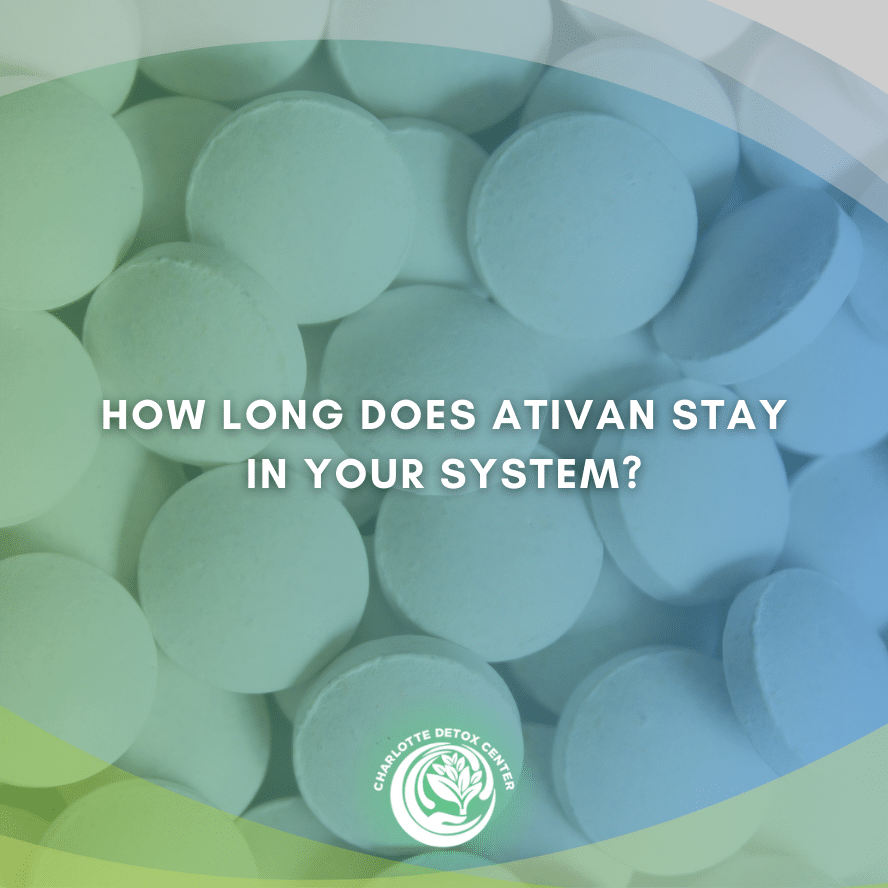How Long Does Ativan Stay in Your System?

Medically Verified: 2/1/24
Medical Reviewer
Chief Editor

All of the information on this page has been reviewed and verified by a certified addiction professional.
Ativan (lorazepam) is a brand-name prescription medication that is used to treat anxiety. Lorazepam is a benzodiazepine medication that may also be used to treat alcohol or benzodiazepine withdrawal.[1] Although Ativan has many practical medical uses, it is also abused by people who are seeking its relaxing and calming effects.
Using Ativan without a prescription, or taking more than you are prescribed, is considered misuse or abuse. Ativan is habit-forming, so abusing it can lead to dependence and addiction. If you are abusing or addicted to Ativan, you may wonder how long it stays in your system so you know when to expect withdrawals to start as well as how long it will take you to pass a drug test.
Ativan usually stays in urine for six to nine days, but this number can vary based on how long you’ve been taking Ativan, what dose you’ve been taking, and other variables. If you or someone you love is addicted to Ativan and in need of professional treatment, please contact Charlotte Detox Center today to learn how our drug detox programs can help.
How is Ativan Metabolized and Eliminated From the Body?
Ativan is a fast-acting drug, but it has a long half-life and can stay in your system for several days. Ativan has a half-life of about 12 hours, so its concentration decreases in the body by 50% every 12 hours.[2] It takes 4-5 half-lives for a drug to leave your body completely, so it can take 48-60 hours for Ativan to leave your system.
Ativan is primarily metabolized in the liver, then the kidneys eliminate it from the body via urine. While Ativan itself can leave your body within a couple of days, trace metabolites can be detected in your urine for several days or weeks after your last dose.
How Long Does Ativan Show Up on a Drug Test?
Ativan can show up on a drug test for days or weeks after the drug itself leaves your body. How long drug tests can detect Ativan varies based on the type of test.
Urine
Urinalysis tests are the most widely used type of drug test because they are affordable, accurate, and minimally invasive. They also have a relatively long detection window. Ativan can be detected in urine for six to nine days after your last dose. However, people who were abusing Ativan and taking high doses may test positive for the drug on a urine test for several weeks.
Blood
Blood tests have a very short detection window and are generally only used in medical settings to confirm or deny intoxication. Ativan can be detected in your blood as early as one to six hours after you take it and for up to three days after your last dose.
Saliva
Saliva tests are also rarely used. Ativan can be detected in saliva just 15 minutes after using it and for up to eight hours after the last dose.
Hair
Hair follicle testing has become more popular in recent years because it can detect drugs, including Ativan, for up to 90 days (three months) after your last dose. However, low doses of Ativan may not show up on a hair follicle test.
Variables that Affect How Long Ativan Stays in Your System
How quickly Ativan leaves your body may vary based on several factors, such as:
- Age, height, weight, and overall metabolism – Personal health factors like these can speed up or slow down the metabolism of certain drugs. For example, older individuals and those with slower metabolisms may notice that Ativan stays in their system for longer periods of time.
- Liver and kidney function – Impaired liver or kidney function can slow down the rate at which Ativan leaves your body.
- Frequency, dose, and length of Ativan use – Using Ativan in larger amounts, more frequently, and/or for longer periods of time will result in more of the drug building up in your system and longer detection times.
- Using Ativan with alcohol or other drugs – Polydrug use can slow down the rate at which substances leave your system. For example, studies show that alcohol abuse can slow down the metabolism of Ativan by nearly 18%.[3]
- Certain foods – Some evidence shows that consuming fatty foods before or while using Ativan can slow down how quickly it is eliminated from your system.
Get Help for Ativan Abuse and Addiction Today
If you’ve been taking more Ativan than you should, it may stay in your body longer than a single dose. Having concerns about passing a drug test because you can’t stop taking Ativan or experiencing withdrawal symptoms when you stop taking it are both signs of addiction.
Stopping taking Ativan after long-term use can be dangerous, resulting in uncomfortable and sometimes life-threatening symptoms of withdrawal. You should always detox from Ativan under close medical supervision before transitioning to an addiction treatment program.
At Charlotte Detox Center, our skilled and experienced medical and therapeutic staff are trained to provide care and support for sufferers of substance use disorders as well as their families. This support includes education on the realities of addiction that de-stigmatize this overwhelmingly common disease.
During detox, dedicated addiction-medicine-trained Nursing and Psychiatric staff monitor each client around the clock to ensure their comfort and safety while detoxing from benzodiazepines like Ativan with us. Our compassionate and skilled clinical staff blend clinically dynamic, evidence-based therapies and complementary modalities with AA’s Twelve Step Program to build a solid foundation of recovery and lasting change.
Don’t wait any longer for the treatment you deserve. Call today to get started.
References:
